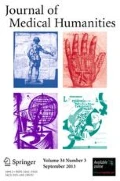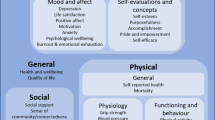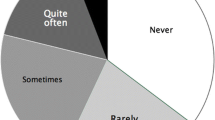Abstract
In the study of organ and tissue transplantation, the focus tends to be on donation. But where there is “giving,” there is also “getting:” receiving help. Altruism, helping behavior, and the exchange of benefits have received extensive attention from social psychological researchers. The gift exchange described by anthropologist Marcel Mauss provides a framework for reviewing this social psychological research on altruism and exchange and applying it to transplantation. An overall conclusion is that altruistic donation is not so ethically or clinically problematic, while receiving help has a complex psychosocial context that needs to be acknowledged and given more attention.
Similar content being viewed by others
REFERENCES
A gift for a stranger: After 3-day friendship, fisherman offered his ailing buddy a kidney. 1991. Omaha World-Herald. 6 September.
Abram, Harry S., and Denton C. Buchanan. 1975. The psychology of renal transplantation. Presented at Harbor General Hospital, University of California, Torrance, cited in Gift of Life, ed. Roberta C. Simmons, Susan Klein Marine, and Richard L. Simmons. New Brunswick, N.J.: Transaction.
Altman, Lawrence K. 1989. The limits of transplantation: How far should surgeons go? New York Times. 19 December.
Antonucci, Toni C., and Charlene F. Depner. 1982. Social support and informal helping relationships. In Basic Processes in Helping Relationships, ed. Thomas Ashby Wills, 233–254. New York: Academic.
Bar-Tal, Daniel. 1976. Prosocial Behavior: Theory and Research. Washington, D.C.: Hemisphere.
Bar-Tal, Daniel, Yaakov Bar-Zohar, Martin S. Greenberg, and Margarete Hermon. 1977. Reciprocity in relationships between donor and recipient and between harm-doer and victim. Sociometry 40: 293–298.
Batson, C. Daniel. 1987. Prosocial motivation: Is it ever truly altruistic? In Advances in Experimental Social Psychology, vol. 20, ed. Leonard Berkowitz, 65–122. New York: Academic.
Batson, C. Daniel. 1991. The Altruism Question: Toward a Social-Psychological Answer. Hillside, N.J.: Erlbaum.
Batson, C. Daniel. 1994. Why act for the public good? Four answers. Personality & Social Psychological Bulletin 20: 603–610.
Batson, C. Daniel, Judy G. Batson, R. Matthew Todd, Beverly H. Brummett, Laura L. Shaw, and Carlo M.R. Aldeguer. 1995. Empathy and the collective good: Caring for one of the others in a social dilemma. Journal of Personality and Social Psychology 68: 619–631.
Bedford, Victoria H. 1989. Ambivalence in adult sibling relationships. Journal of Family Issues 10: 221–224.
Belk, Russell W. 1990. Me and thee versus mine and thine: How perceptions of the body influence organ donation and transplantation. in Organ Donation and Transplantation: Psychological and Behavioral Factors, ed. James Shanteau and Richard Jackson Harris, 139–149. Washington, D.C.: American Psychological Association.
Bellah, Robert N., Richard Madsen, William M. Sullivan, Ann Swidler, and Steven M. Tipton. 1985. Habits of the Heart: Individualism and Commitment in American Life. Berkeley, CA: University of California Press.
Bernstein, Dorothy M. 1977. Psychiatric assessment of the adjustment of transplanted children. In Gift of Life, ed. Roberta G. Simmons, Susan Klein Marine, and Richard L. Simmons, 119–147. New Brunswick, N.J.: Transaction.
Blau, Peter. 1964. Exchange and Power in Social Life. New York: Wiley.
Bourdieu, Pierre. 1979. Algeria 1960. Cambridge: Cambridge University Press.
Bratton, Leticia B., and Linner Ward Griffin. 1994. A kidney donor's dilemma: The sibling who can donate—but doesn't. Social Work in Health Care 20: 75–96.
Brehm, Jack W. 1966. A Theory of Psychological Reactance. New York: Academic.
Briar, Scott. 1966. Welfare from below: Recipient's view of the public welfare system. In The Law of the Poor, ed. Jacobus tenBroek, 46–61. San Francisco: Chandler.
Brown, Roger. 1986. Social Psychology: The Second Edition. New York: Free Press.
Caplow, Theodore. 1982. Christmas gifts and kin networks. American Sociological Review 47: 383–392.
Caplow, Theodore, Howard M. Bahr, Bruce A. Chadwick, Reuben Hill, and Margaret Holmes Williamson. 1982. Middletown Families: Fifty Years of Change and Continuity. Minneapolis: University of Minnesota Press.
Cialdini, Robert B., Mark Schaller, Donald Houlihan, Kevin Arps, Jim Fultz, and A. L. Beaman. 1987. Empathy-based helping: Is it selflessly or selfishly motivated? Journal of Personality and Social Psychology 52: 749–758.
Clark, Margaret S. 1983. Reactions to aid in communal-exchange relationships. In New Directions in Helping, vol. 1, ed. Jeffrey D. Fisher, Arie Nadler, and Bella M. DePaulo, 281–304. New York: Academic.
Clark, Margaret S., and Judson R. Mills. 1979. Interpersonal attraction in exchange and communal relationships. Journal of Personality and Social Psychology 37: 12–24.
Clark, Margaret S., Judson R. Mills, and David M. Corcoran. 1989. Keeping track of needs and inputs of friends and strangers. Personality & Social Psychological Bulletin 15: 533–542.
Coyne, James C., Camille B. Wortman, and Darrin R. Lehman. 1988. The other side of support: Emotional overinvolvement and miscarried helping. In Marshalling Social Support: Formats, Process, and Effects, ed. Benjamin H. Gottlieb, 305–330. Newbury Park, CA: Sage.
Dew, Mary A., R. G. Simmons, Loren H. Roth, Herbert C. Schulberg, M. E. Thompson, J. M. Armitage, and B. P. Griffith. 1994. Psychosocial predictors of vulnerability to distress in the year following heart transplantation. Psychological Medicine 24: 929–945.
Dougherty, Charles J. 1986. A proposal for ethical organ donation. Health Affairs: 105–110.
Dowd, Maureen. 1984. The night that 38 stood by as a life was lost. New York Times. 12 March.
Eckholm, Erik. 1991. Patients and insurers clash on therapy's outer limits. New York Times. 19 September.
Edwards, John N. 1991. New conceptions: Biosocial innovations and the family. Journal of Marriage and the Family 53: 349–360.
Ehlstain, Jean Bethke. 1990. Power Trips and Other Journey: Essays in Feminism as Civic Discourse. Madison, WI: University of Wisconsin Press.
Etzioni, Amitai. 1988. The Moral Dimension: Toward a New Economics. New York: Free Press.
Fellner, Carl H., and John R. Marshall. 1981. Kidney donors revisited. In Altruism and Helping Behavior, ed. J. Phillipe Rushton and Richard M. Sorrentino, 351–365. Hillsdale, NJ: Erlbaum.
Fisher, Jeffrey D., Bella M. DePaulo, and Arie Nadler. 1981. Extending altruism beyond the altruistic act: The mixed effects of aid on the help recipient. In Altruism and Helping Behavior, ed. J. Philippe Rushton and Richard M. Sorrentino 367–422. Hillsdale, NJ: Erlbaum.
Fisher, Jeffrey D., and Arie Nadler. 1982. Determinants of recipient reactions to aid: Donor-recipient similarity and perceived dimensions of problems. In Basic Processes in Helping Relationships, ed. Thomas Ashby Wiils, 131–153. New York: Academic.
Fisher, Jeffrey D., Arie Nadler, and Sheryle Whitcher-Alagna. 1982. Recipient reactions to aid. Psychological Bulletin 91: 27–54.
Fortner-Frazier, Carrie. 1981. Social Work and Dialysis: The Medical and Psychosocial Aspects of Kidney Disease. Berkeley: University of CA Press.
Fox, Renee C. 1994. The medicalization and demedicalization of American Society. In Health and Illness: Critical Perspectives, 4th ed., ed. Peter Conrad and Rochelle Kern, 403–410. New York: St. Martin's Press.
Fox, Renee C., and Judith P. Swazey. 1978 [1974]. The Courage to Fail: A Social View of Organ Transplantation and Dialysis. Chicago: University of Chicago Press.
Franklin, Clyde II. 1982. Theoretical Perspectives in Social Psychology. Boston: Little, Brown.
Frazier, Patricia A., Susan Davis-Ali, and Karin E. Dahl. 1995. Stressors, social support, and adjustment in kidney transplant patients and their spouses. Social Work in Health Care 21: 93–108.
Freund, Barbara L., and Karolyn Siegel. 1986. Problems in transition following bone marrow transplantation: Psychosocial aspects. American Journal of Orthopsychiatry 56: 244–252.
Gergen, Kenneth J., and Mary Gergen. 1974. Foreign aid that works. Psychology Today 8: 54–58.
Glendon, Mary Ann. 1981. The New Family and the New Property. Toronto: Butterworth.
Goodwin, Leonard. 1972. Do the Poor Want to Work? A Social Psychological Study of Work Orientations. Washington, D.C.: The Brookings Institution.
Goleman, Daniel. 1989. What's under a tree? Clues to a relationship. New York Times. 19 December. C-1, C-13.
Gouldner, Alvin W. 1960. The norm of reciprocity: A preliminary statement. American Sociological Review 25: 161–178.
Greiner, Carl B. 1990a. Compliance. Presentation to the Omaha Transplant Study Group. 14 December.
Greiner, Carl B. 1990b. Personal communication. 11 January.
Homans, George. 1961. Social Behavior: Its Elementary Forms. New York: Harcourt, Brace, and World.
Hyde, Lewis. 1983. The Gift: Imagination and the Erotic Life of Property. New York: Random House.
Jurgens, Jody. 1991. Personal communication. 30 September.
Kidda, Michael, and Sidney Rosen. 1994. Helping as controlling: Normative and dispositional control perspectives affecting aid-giving. Journal of Social Behavior and Personality 9: 335–348.
Kohn, Alfie. 1989. The Brighter Side of Human Nature: Altruism and Empathy. New York: Basic.
Kolata, Gina. 1991. More babies being born to be donors of tissue. New York Times. 4 June.
Kreiger, Lloyd M. 1996. A life-and-death proposal. New York Times. 5 June.
Kugler, Joachim, G. Tenderich, P. Stahlhut, H. Posival, M. M. Korner, R. Korfer, and G. M. Kruskemper. 1994. Emotional adjustment and perceived locus of control in heart transplant patients. Journal of Psychosomatic Research 38: 403–408.
Land, W. 1989. The problem of living organ donation: Facts, thoughts, and reflections. Transplant International 2: 168–179.
Levi-Strauss, Claude. 1969 [1949]. The Elementary Structures of Kinship. Boston: Beacon.
Levine, Helen Batten. 1988. “Gifts to Strangers: Conflict and Accord in Organ Donation.” Unpublished Ph.D. dissertation. Department of Sociology, Boston College.
Levinger, George. 1974. A 3-level approach to attraction: Toward an understanding of pair relatedness. In Foundations of Interpersonal Attraction, ed. Ted L. Huston, 99–120. New York: Academic Press.
Levy, Norman B. 1994. Psychological aspects of renal transplantation. Psychosomatics 35: 427–433.
Litwins, Nola, James R. Rodrigue, and Roy S. Weiner. 1994. Quality of life in adult recipients of bone marrow transplantation. Psychological Reports 75: 323–328.
McGrath, Mary. 1991a. Donor says, “It's only 4 days of your life” to save another. Omaha World-Herald. 12 July.
McGrath, Mary. 1991b. Drive for bone marrow under way in Omaha. Omaha World-Herald. 12 September.
McGrath, Mary. 1991c. New ties bind siblings: Adopted brother donates kidney to sister. Omaha World-Herald. 9 December.
Mansbridge, Jane. 1995. Rational choice gains by losing. Political Economics and Political Psychology 16: 137–155.
Mauss, Marcel. 1954 [1925]. The Gift: Forms and Functions of Exchange in Archaic Societies. Glencoe, IL: The Free Press.
Menzel, Paul T. 1990. Strong Medicine: The Ethical Rationing of Health Care. New York: Oxford University Press.
Mills, Judson. R., and Margaret S. Clark. 1982. Exchange and communal relationships. In Review of Personality and Social Psychology, vol. III, ed. Ladd Wheeler, 121–144. Beverly Hills, CA: Sage.
Missouri man donates kidney as present for his bride-to-be. 1991. Omaha World-Herald. 8 September.
Monroe, Kristen Renwick, and Connie Epperson. 1994. “But what else could I do?” Choice, identity, and a cognitive perceptual theory of ethical political behavior. Political Psychology 15: 201–226.
Murstein, Bernard I., Mary Cerreto, and Marcia G. MacDonald. 1977. A theory and investigation of the effect of exchange theory on marriage and friendship. Journal of Marriage and the Family 39: 543–548.
Nadler, Arie, and Jeffrey D. Fisher. 1984. Effects of donor-recipient relationships on recipients' reactions to aid. In The Development and Maintenance of Prosocial Behavior: International Perspectives, ed. Ervin Staub et al., 397–418. New York: Plenum.
Patenaude, Andrea Farkas, Ludwik Szmanski, and Joel Rappeport. 1979. Psychological costs of bone marrow transplantation in children. Americal Journal of Orthopsychiatry 49: 409–421.
Pauley, Jane. 1991. Real Life. Documentary on bone marrow transplant patient and family. CBS. Spring.
Piliavin, Jane Allyn, and Hong-wen Charng. 1990. Altruism: A review of recent theory and research. In Annual Review of Sociology, vol. 16, ed. W. W. Richard Scott and Judith Blake, 27–65. Palo Alto, CA: Annual Reviews, Inc.
Reiss, David, Sandra Gonzalez, and Norman Kramer. 1986. Family process, chronic illness, and death: On the weakness of strong bonds. Archives of General Psychiatry 43: 795–804.
Riessman, Frank. 1990. Restructuring help: A human services paradigm for the 1990s. American Journal of Community Psychology 13: 221–231.
Robertson, Elizabeth B., Glen H. Elder, Jr., Martie L. Skinner, and Rand D. Conger. 1991. The costs and benefits of social support in families. Journal of Marriage and the Family 53: 403–416.
Sadler, H. Harrison, Leslie Davison, Charles Carroll, and Samuel L. Kountz. 1971. The living, genetically unrelated kidney donor. Seminars in Psychiatry 16: 299–310.
Saint-Exupéry, Antoine de. 1946 [1943]. Le Petit Prince. Boston: Houghton Mifflin.
Saks, Michael J., and Edward Krupat. 1988. Social Psychology and Its Applications. New York: Harper's.
Schlebusch, Lourens, Basil J. Pillay, and Johan Louw. 1992. Body-image differences in live-related and cadaver renal transplant recipients. South African Journal of Psychology 22: 70–75.
Simmons, Roberta G. 1991. Altruism and sociology. The Sociological Quarterly 32: 1–22.
Simmons, Roberta G., Susan Klein Marine, and Richard L. Simmons, eds. 1987 [1977]. Gift of Life: The Effect of Organ Transplantation on Individual, Family, and Societal Dynamics, rev. ed. New Brunswick, N.J.: Transaction.
Stacey, Judith. 1990. Brave New Families: Stories of Domestic Upheaval in Late Twentieth Century America. New York: Basic.
Stack, Carol B. 1974. All Our Kin: Strategies for Survival. New York: Harper.
Starzl, Thomas E. 1985. Will live organ donations no longer be justified? Hastings Center Report. 15: 5.
Staub, Ervin. 1978. Positive Social Behavior and Morality, v. 1. Social and Personal Influences. New York: Academic.
Thibault, John, and Harold H. Kelley. 1979. The Social Psychology of Groups. New York: Wiley.
Titmuss, Richard M. 1971. The Gift Relationship: From Human Blood to Social Policy. New York: Pantheon.
Vaughan, Genevieve. 1991. The gift economy. MS. May/June, 84–85.
Walster [Hatfield], Elaine, G. William Walster, and Ellen Berscheid. 1973. New directions in equity research. Journal of Personality and Social Psychology 25: 151–176.
Walster [Hatfield], Elaine, G. William Walster, and Ellen Berscheid. 1978. Equity: Theory and Research. Boston: Allyn and Bacon.
Webster's Third New International Dictionary. 1976. Ed. Philip Babcock Gove. Springfield, MA: G. and C. Merriam Company.
Whitcher-Alagna, Sheryl. 1983. Receiving medical help: A psychosocial perspective on patient reactions. In New Directions in Helping, vol. 3, ed. Arie Nadler, Jeffrey D. Fisher, and Bella M. DePaulo, 131–161. New York: Academic.
Wills, Thomas Ashby, ed. 1982. Basic Processes in Helping Behavior. New York: Academic.
Worchel, Stephen. 1984. The darker side of helping: The social dynamics of helping and cooperation. In Development and Maintenance of Prosocial Behavior: International Perspectives, ed. Ervin Staub et al., 379–418. New York: Plenum.
Zimmerman, Mary K. 1977. Passage through Abortion: The Personal and Social Reality of Women's Experiences. New York: Praeger.
Author information
Authors and Affiliations
Rights and permissions
About this article
Cite this article
Lamanna, M.A. Giving and Getting: Altruism and Exchange in Transplantation. Journal of Medical Humanities 18, 169–192 (1997). https://doi.org/10.1023/A:1025637702288
Issue Date:
DOI: https://doi.org/10.1023/A:1025637702288




